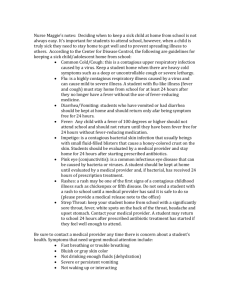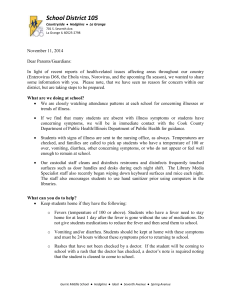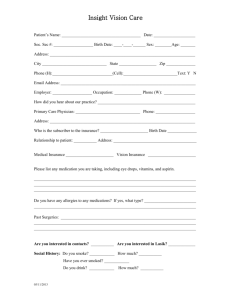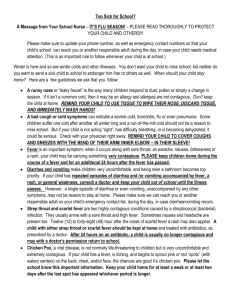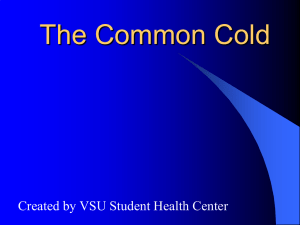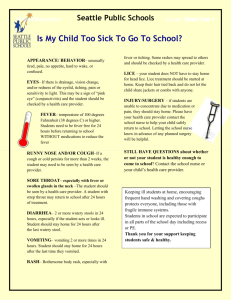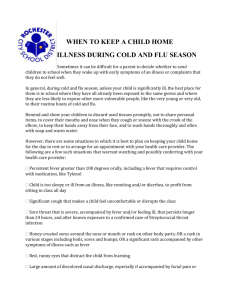IS YOUR CHILD TOO SICK FOR SCHOOL?
advertisement
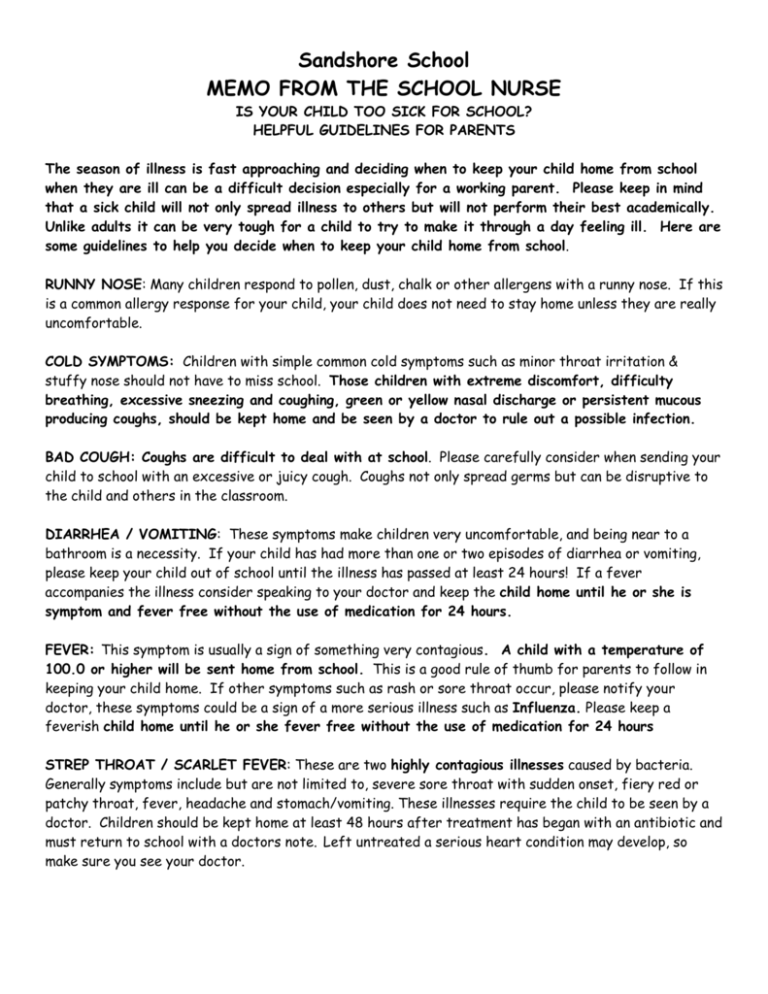
Sandshore School MEMO FROM THE SCHOOL NURSE IS YOUR CHILD TOO SICK FOR SCHOOL? HELPFUL GUIDELINES FOR PARENTS The season of illness is fast approaching and deciding when to keep your child home from school when they are ill can be a difficult decision especially for a working parent. Please keep in mind that a sick child will not only spread illness to others but will not perform their best academically. Unlike adults it can be very tough for a child to try to make it through a day feeling ill. Here are some guidelines to help you decide when to keep your child home from school. RUNNY NOSE: Many children respond to pollen, dust, chalk or other allergens with a runny nose. If this is a common allergy response for your child, your child does not need to stay home unless they are really uncomfortable. COLD SYMPTOMS: Children with simple common cold symptoms such as minor throat irritation & stuffy nose should not have to miss school. Those children with extreme discomfort, difficulty breathing, excessive sneezing and coughing, green or yellow nasal discharge or persistent mucous producing coughs, should be kept home and be seen by a doctor to rule out a possible infection. BAD COUGH: Coughs are difficult to deal with at school. Please carefully consider when sending your child to school with an excessive or juicy cough. Coughs not only spread germs but can be disruptive to the child and others in the classroom. DIARRHEA / VOMITING: These symptoms make children very uncomfortable, and being near to a bathroom is a necessity. If your child has had more than one or two episodes of diarrhea or vomiting, please keep your child out of school until the illness has passed at least 24 hours! If a fever accompanies the illness consider speaking to your doctor and keep the child home until he or she is symptom and fever free without the use of medication for 24 hours. FEVER: This symptom is usually a sign of something very contagious. A child with a temperature of 100.0 or higher will be sent home from school. This is a good rule of thumb for parents to follow in keeping your child home. If other symptoms such as rash or sore throat occur, please notify your doctor, these symptoms could be a sign of a more serious illness such as Influenza. Please keep a feverish child home until he or she fever free without the use of medication for 24 hours STREP THROAT / SCARLET FEVER: These are two highly contagious illnesses caused by bacteria. Generally symptoms include but are not limited to, severe sore throat with sudden onset, fiery red or patchy throat, fever, headache and stomach/vomiting. These illnesses require the child to be seen by a doctor. Children should be kept home at least 48 hours after treatment has began with an antibiotic and must return to school with a doctors note. Left untreated a serious heart condition may develop, so make sure you see your doctor. CHICKEN POX: This is also a highly contagious illness that can be prevented through vaccination by your doctor. Symptoms include “flu-like” aches and fever followed by the outbreak of pinkish/red spots with watery centers on the back, chest, neck and then general over the body. Be on the lookout for symptoms 12-21 days after an exposure. There have been many reported vaccine breakthrough cases. Your child must be kept home for at least 7 days from the time you noticed the first symptom, and/or at least two days after the last spot has crusted over. The child must be seen by the school nurse before entering back in school. PINK EYE: Otherwise known as conjunctivitis is very contagious. This illness is spread though eye to hand contact and over surfaces. Hand washing is critical to prevent spread. Symptoms include crusty, sticky, itchy red eyes which may or may not have thick drainage. Pink-Eye can be viral or bacterial but, in either case the child must be seen by a doctor before returning to school and at least 24 hours after treatment has begun. EAR INFECTIONS/PAIN: Children should stay home for at least 24 hours after treatment or fever. An infection left untreated can lead to permanent hearing damage so, please seek medical attention for ear pain. IMPETIGO: Impetigo is an extremely contagious bacterial skin disease. A strep. bacteria causes sores or lesions on the skin. The areas may begin as insect bites or cold sores but then develop blisters that rupture and ooze sticky, honey colored crust. The lesions spread and the child needs to be seen by a doctor for the proper treatment. The child may return to school after 24hours of treatment. RINGWORM: Ringworm is a fungus that creates a red, scaly ring around a clear center. This fungus can occur on the body or the scalp and is contagious. Over the counter anti-fungal medications may help, if there is no improvement with these products a doctor’s visit is necessary and then24 hours of treatment is needed before the student returns to school. The student needs to see the nurse upon returning. All outbreaks must be covered. If the patch cannot be covered or the child has multiple patches they will require a doctor’s clearance to return to school. MEDICATIONS: Any medications that a child may need to take in school including prescription, over the counter remedy’s such as Tylenol or cough drops require A note from the parent, A doctor’s order (a printable form can be found on the Health Office webpage) Must be delivered by an adult an in the original labeled container. If you have any questions or concerns please feel free to contact me at (973) 691-4003 extension 3480 at any time. Suzanne Herbst, RN, CSN Sandshore School Nurse
